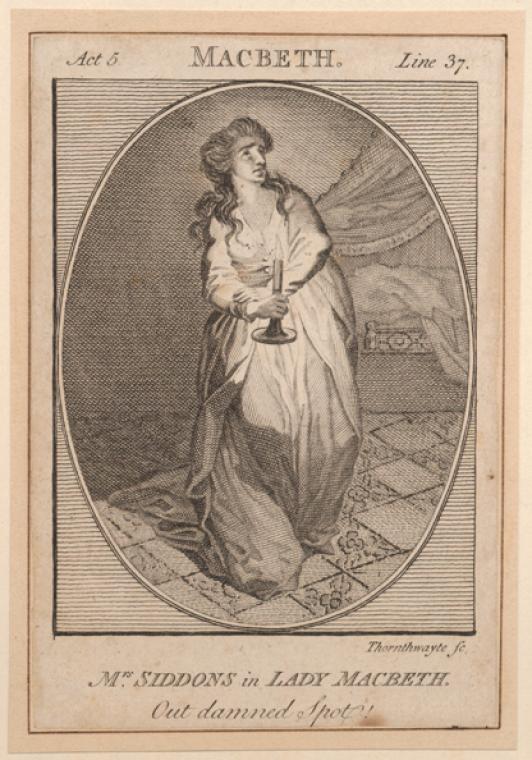Romantic Interests: Scrapbooks on Sarah Siddons, "Queen of Tears"

One hundred years ago, Carl Pforzheimer bought a two-volume set of quarto-sized scrapbooks containing a large collection of ephemera on the English actress Sarah Siddons (1755-1831). Assembled by an unknown but dedicated fan, the scrapbooks contain over 300 pages of newspaper clippings, playbills, and manuscripts documenting Siddons's career and reception.
The unassuming volumes, bound in tattered and soiled brown wrappers, have been a part of the NYPL's Pforzheimer Collection since it came to the Library in 1986. Though they have been seen by a handful of scholars throughout the years, they remained uncataloged until very recently. An item-level finding aid describing the scrapbooks' manuscripts can now be found here.
The Life and Career of Sarah Siddons
Sarah Siddons is widely regarded as the greatest English tragic actress of her time. Such were her powers to move the hearts and lacrimal glands of those who attended her performances that she acquired the title "Queen of Tears."
Born Sarah Kemble into a family of actors, her earliest recorded performance was at age eleven, as Ariel in a production of The Tempest put on by her father's theater company. Around age fourteen, she began a romance with the twenty-six-year-old actor William Siddons; they married a few years later. It was an unhappy union, and Sarah Siddons outlived five of the couple's seven children.
Most of the fifty-seven manuscripts in the scrapbooks are in William Siddons's hand, and relate to his wife's income: receipts recording her salary, letters complaining about delayed payments, etc. At this time, of course, any money a married woman earned could legally be claimed by her husband. In 1800 William begins a hostile letter to the treasurer of the Drury Lane Theatre: "What a pleasant and what a new thing it would be to have a few voluntary payments . . . ."
Sarah Siddons's London debut on December 29, 1775 is documented in the scrapbooks by a manuscript tracing of the Drury Lane Theatre's playbill. She played Portia in The Merchant of Venice, and is credited only as "a young lady (being her first appearance)." The compiler leaves out any evidence that the performance was, in fact, a complete disaster, eliciting one newspaper reviewer's scathing comment that Siddons had "vulgarity in her tones."
Siddons spent the next seven years improving her skills as a tragedian, mostly in smaller cities—particularly Bath—and by the time she returned to the London stage in October 1782, she was already a superstar. She played the title role in the now largely forgotten tragicomedy Isabella, or, The Fatal Marriage, and it was a rousing success.

Siddons kept a grueling work schedule that was periodically interrupted by illness. Another theatrical poster tracing in the scrapbooks, dated May 17, 1783, announces: "There will be no play this evening, on account of the indisposition of Mrs. Siddons." By this time, Siddons had learned that her compromised health was due in part to the venereal disease she had contracted from her philandering husband .
Siddons's performances as Lady Macbeth, her signature role, are well-represented by the scrapbooks, both by printed handbills and newspaper clippings. One enthusiastic reviewer in 1810 urges readers to go see her performance, "a Dramatic Comet, whose passage is as rare as it is luminous!"
Though she took on a few later performances, Siddons officially retired in 1812. Among the few manuscripts in her hand found in the scrapbooks is a simple note from the following year acknowledging the receipt of £4 in exchange for six silk petticoats. She apparently no longer had any use for them.
Read E-Books with SimplyE
 With your library card, it's easier than ever to choose from more than 300,000 e-books on SimplyE, The New York Public Library's free e-reader app. Gain access to digital resources for all ages, including e-books, audiobooks, databases, and more.
With your library card, it's easier than ever to choose from more than 300,000 e-books on SimplyE, The New York Public Library's free e-reader app. Gain access to digital resources for all ages, including e-books, audiobooks, databases, and more.
If you don’t have an NYPL library card, New York State residents can apply for a digital card online or through SimplyE (available on the App Store or Google Play).
Need more help? Read our guide to using SimplyE.
